
Resources for Online Language Pedagogy
This page contains materials specifically designed to support the professional learning needs of online world language educators and developed as part of our multi-year Online Language Pedagogy Modules project.
- Introduction to Online Language Teaching
- Designing Interaction for Online Language Learning
- Materials Development for Online Language Courses
- Assessment in Online Language Courses
- Selecting and Adapting Materials for Online Language Learning and Teaching
- Supporting Students in Online Language Learning: Voices of Experience
- Engaging Online Language Learners through SEL
- Chinese Online Language Pedagogy
- Russian Online Language Pedagogy
Russian Online Language Pedagogy
This NFLRC professional learning opportunity, designed specifically for online Russian language teachers, focused on three key areas of teaching Russian online: 1) Adapting materials and resources; 2) Teaching writing and reading in Russian; and 3) Learner interaction.
We’ve divided the three panel sessions up by interview question (see TED-Ed lessons below), providing you with a quick and easy way to access the particular content you want in the time you have. Resources mentioned in the clips are included in the Dig Deeper sections, and we encourage you to share your own responses to the interview questions in the Discuss sections.
And for those who prefer to watch everything all at once, the full video recordings for all 3 panels can be found on our NFLRC YouTube channel.
More about the Russian Online Language Pedagogy project

Russian OLP Panel 1, Question 1
What aspects of Russian do you think are most challenging to teach online?
Panelists: Olga Klimova, Larisa Shuvalova, Shannon Donnally Quinn, & Evgeny Dengub
Facilitator: Sarah Boutin
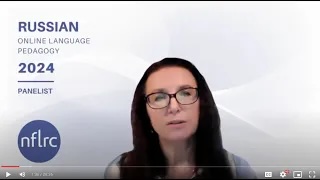
Russian OLP Panel 1, Question 2
How do we serve both heritage and non heritage learners when looking to adapt materials?
Panelists: Larisa Shuvalova, Shannon Donnally Quinn, Evgeny Dengub, & Olga Klimova
Facilitator: Sarah Boutin
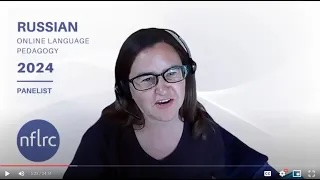
Russian OLP Panel 1, Question 3
How can we use authentic materials to add cultural lessons into online content?
Panelists: Olga Klimova, Shannon Donnally Quinn, Evgeny Dengub, & Larisa Shuvalova
Facilitator: Sarah Boutin

Russian OLP Panel 1, Question 4
Can you tell us about some lessons learned from using AI tools in the online Russian classroom?
Panelists: Larisa Shuvalova, Shannon Donnally Quinn, Evgeny Dengub, & Olga Klimova
Facilitator: Sarah Boutin

Russian OLP Panel 2, Question 1
How do you start teaching reading and writing in Russian in general? (cyrillic alphabet, sound systems, characters…)?
Panelists: Shannon Donnally Quinn & Heather Rice
Facilitator: Sarah Boutin
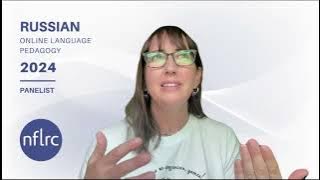
Russian OLP Panel 2, Question 2
How do you teach students the Cyrillic alphabet in an online environment?
Panelists: Heather Rice & Shannon Donnally Quinn
Facilitator: Sarah Boutin

Russian OLP Panel 2, Question 3
How much handwriting do you use and teach in the online classroom?
Panelists: Shannon Donnally Quinn & Heather Rice
Facilitator: Sarah Boutin
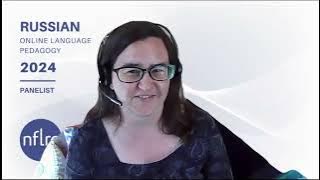
Russian OLP Panel 2, Question 4
What are some challenges students face when learning to type the Cyrillic alphabet?
Panelists: Heather Rice & Shannon Donnally Quinn
Facilitator: Sarah Boutin

Russian OLP Panel 2, Question 5
How do you work with scaffolding when students are reading or writing?
Panelists: Shannon Donnally Quinn & Heather Rice
Facilitator: Sarah Boutin
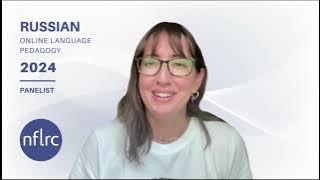
Russian OLP Panel 2, Question 6
Where are Russian students more likely to need scaffolding in an online classroom?
Panelists: Heather Rice & Shannon Donnally Quinn
Facilitator: Sarah Boutin
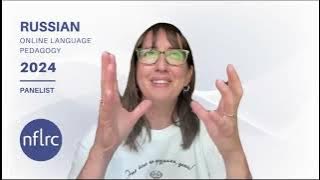
Russian OLP Panel 2, Question 7
How can teachers effectively use authentic materials in a level 1 classroom where students have no background knowledge of the language?
Panelists: Shannon Donnally Quinn & Heather Rice
Facilitator: Sarah Boutin

Russian OLP Panel 2, Question 8
What do you find students learning Russian struggle the most with when engaging in reading or writing related activities? How do you overcome these challenges?
Panelists: Shannon Donnally Quinn & Heather Rice
Facilitator: Sarah Boutin
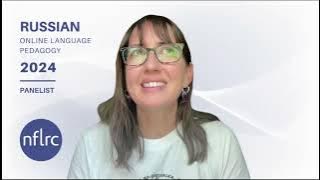
Russian OLP Panel 2, Question 9
How do you discuss the appropriate use of translators or AI with your students?
Panelists: Heather Rice & Shannon Donnally Quinn
Facilitator: Sarah Boutin

Russian OLP Panel 3, Question 1
What makes the Russian language challenging to use when fostering learner to learner interaction?
Panelists: Olga Klimova, Larisa Shuvalova, Evgeny Dengub, & Heather Rice
Facilitator: Sarah Boutin
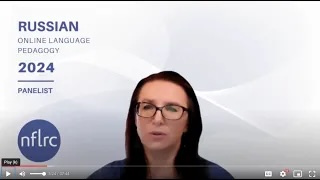
Russian OLP Panel 3, Question 2
How do you use technology or online resources to overcome those challenges?
Panelists: Larisa Shuvalova, Evgeny Dengub, Heather Rice, & Olga Klimova
Facilitator: Sarah Boutin
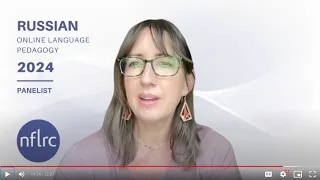
Russian OLP Panel 3, Question 3
How do you provide feedback that’s necessary to learn while encouraging students to partake in learner interaction in the online environment?
Panelists: Olga Klimova, Larisa Shuvalova, Evgeny Dengub, & Heather Rice
Facilitator: Sarah Boutin

Russian OLP Panel 3, Question 4
What kinds of things that are unique to Russian that can make giving feedback more challenging for students? How do you address this?
Panelists: Heather Rice, Olga Klimova, Evgeny Dengub, & Larisa Shuvalova
Facilitator: Sarah Boutin

Russian OLP Panel 3, Question 5
How can online Russian educators use culture to build the classroom community and foster a fun and positive online environment?
Panelists: Larisa Shuvalova, Evgeny Dengub, Olga Klimova, & Heather Rice
Facilitator: Sarah Boutin
Chinese Online Language Pedagogy
This NFLRC professional learning opportunity, designed specifically for online Mandarin Chinese language teachers, focused on three key areas of teaching Chinese online: 1) Identifying and evaluating resources; 2) Managing and fostering online interaction; and 3) Assessment and feedback.
We’ve divided the three panel sessions up by interview question (see TED-Ed lessons below), providing you with a quick and easy way to access the particular content you want in the time you have. Resources mentioned in the clips are included in the Dig Deeper sections, and we encourage you to share your own responses to the interview questions in the Discuss sections.
And for those who prefer to watch everything all at once, the full video recordings for all 3 panels can be found on our NFLRC YouTube channel.
More about the Chinese Online Language Pedagogy project

Chinese OLP Panel 1, Question 1
What aspects of Mandarin Chinese do you think are most challenging to teach online?
Panelists: Ying Jin, Ke Peng, Terry Waltz, & Penny Wang
Facilitator: Sarah Boutin

Chinese OLP Panel 1, Question 2
How do you help students learn Chinese characters?
Panelists: Ying Jin, Ke Peng, Terry Waltz, & Penny Wang
Facilitator: Sarah Boutin

Chinese OLP Panel 1, Question 3
How do you assess student interaction with materials?
Panelists: Ying Jin, Ke Peng, Terry Waltz, & Penny Wang
Facilitator: Sarah Boutin

Chinese OLP Panel 1, Question 4
How do you weed out the weeds when there is so much noise out there? How do you decide if a resource is good?
Panelists: Ying Jin, Ke Peng, Terry Waltz, & Penny Wang
Facilitator: Sarah Boutin

Chinese OLP Panel 2, Question 1
How do you start teaching online in general (Pinyin, sound systems, characters…)? What works better for online learning in your experience?
Panelists: Matt Coss, Ying Jin, and Terry Waltz
Facilitator: Sarah Boutin
Chinese OLP Panel 2, Question 2
How do you help students learn Chinese characters?
Panelists: Matt Coss, Ying Jin, and Terry Waltz
Facilitator: Sarah Boutin
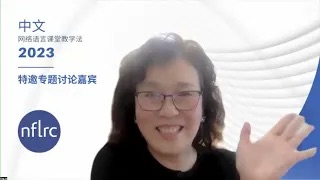
Chinese OLP Panel 2, Question 3
What do you find students learning Mandarin Chinese struggle the most with when engaging in online interpersonal activities? How do you overcome these challenges?
Panelists: Matt Coss, Ying Jin, and Terry Waltz
Facilitator: Sarah Boutin

Chinese OLP Panel 1, Question 3
How do you assess student interaction with materials?
Panelists: Ying Jin, Ke Peng, Terry Waltz, & Penny Wang
Facilitator: Sarah Boutin

Chinese OLP Panel 2, Question 4
How do you engage students to abide by good digital citizenship practices specifically when learning Mandarin Chinese online?
Panelists: Matt Coss, Ying Jin, and Terry Waltz
Facilitator: Sarah Boutin
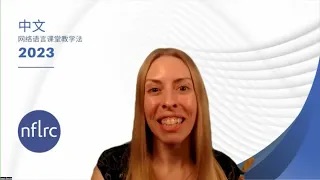
Chinese OLP Panel 3, Question 1
What is it about Mandarin Chinese that makes it extra challenging to assess students, more specifically in an online environment?
Panelists: Matt Coss, Ke Peng, & Penny Wang
Facilitator: Sarah Boutin

Chinese OLP Panel 3, Question 2
When providing feedback in the online environment, how do you address the needs of your students who may be struggling with Mandarin Chinese?
Panelists: Matt Coss, Ke Peng, & Penny Wang
Facilitator: Sarah Boutin

Chinese OLP Panel 3, Question 3
What are some of the biggest challenges with providing feedback for students learning Mandarin Chinese? How do you overcome these?
Panelists: Matt Coss, Ke Peng, & Penny Wang
Facilitator: Sarah Boutin

Chinese OLP Panel 3, Question 4
Why is backward design important for Mandarin Chinese assessments especially?
Panelists: Matt Coss, Ke Peng, & Penny Wang
Facilitator: Sarah Boutin

Chinese OLP Panel 3, Question 5
If you could implement only 1 thing into making your assessments for Mandarin Chinese more robust, what would you do?
Panelists: Matt Coss, Ke Peng, & Penny Wang
Facilitator: Sarah Boutin
Engaging Online Language Learners through SELSupporting Students in Online Language Learning: Voices of Experience
This series highlights how online language instructors can use the Social Emotional Learning Framework to engage students in the virtual classroom and enhance the experience and satisfaction of learning a language online. Topics include highlighting learner self awareness, promoting self management and self motivation, expanding social awareness through online extracurricular activities, teaching responsible decision making through storytelling and building positive relationship skills in a supportive way.
More about the Engaging Online Language Learners through SEL project

Integrating SEL in Online Language Classrooms
Presented by Ann Marie Gunter
Developing Self Awareness Skills in the Language Classroom
Presented by Xatli Stox
SEL and Engagement in the Virtual Classroom
Presented by Shara Packman

Building Compassion and Curiosity in Online Learning
Presented by Yo Azama
SEL in the World Languages Classroom: Developing Responsible Decision-Making through Storytelling
Presented by Alegría Ribadeneira
Beyond Basic Storytelling
Presented by Ed Bamford
Fostering Community in an Online Learning Environment
Presented by Revae Bostwick

Raising Social Awareness Through Cultural Connections
Presented by Meaghan DeRusso

Cooking ASL in the COVID Kitchen: Leveraging language-learning tools to entice and engage
Presented by Jan Fried

Positive Interactions in the Online Language Classroom to Improve Relationship Skills
Presented by Megan Ferry
Supporting Students in Online Language Learning: Voices of Experience
The following lessons on supporting students in online language learning were developed by the National Foreign Language Resource Center in partnership with the North Carolina Virtual Public School. These lessons place the experience of longtime online language educators at the service of the profession, focusing on nitty-gritty aspects of supporting student success in online language learning and teaching.
More about the Supporting Students in Online Language Learning: Voices of Experience project

EPISODE 1
Launching a Successful Semester
Interviewer: Sarah Boutin
Interviewees: Meredith White, Lauren Rosen, Erin Pendergast, Crystal Marull

EPISODE 2
Launching a Successful Semester: More on the Onboarding Process
Interviewer: Sarah Boutin
Interviewees: Lauren Rosen, Erin Pendergast, Crystal Marull, Florencia Henshaw, Elizabeth Edwards

EPISODE 3
Building Strong Relationships with Your Students
Interviewer: Sarah Boutin
Interviewees: Deborah Cafiero, Lauren Rosen, Erin Pendergast, Aria Cabot, Teryn Odom, Edna Rodriguez, Florencia Henshaw
EPISODE 4
Finding Support for Students Facing Challenges
Interviewer: Sarah Boutin
Interviewees: Teryn Odom, Elizabeth Edwards, Erin Pendergast, Deborah Cafiero

EPISODE 5
Building Supportive Peer Communities
Interviewer: Sarah Boutin
Interviewees: Aria Cabot, Sabrina Wengier, Florencia Henshaw, Crystal Marull, Elizabeth Edwards, Erin Pendergast

EPISODE 6
Has the Meaning of Assessment Changed?
Interviewer: Sarah Boutin
Interviewees: Mariam Manzur Leiva, Sandrine Hope, Aria Cabot
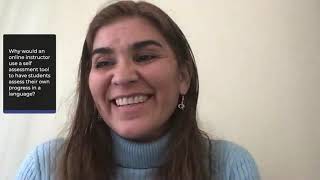
EPISODE 7
Is Self Assessment a Good Idea?
Interviewer: Sarah Boutin
Interviewees: Mariam Manzur Leiva, Alexa Haselhorst

EPISODE 8
Student Engagement in Online Settings
Interviewer: Sarah Boutin
Interviewees: Sabrina Wengier, Erin Pendergast, Deborah Cafiero, Florencia Henshaw

EPISODE 9
Personalized Learning
Interviewer: Sarah Boutin
Interviewees: Teryn Odom, Edna Rodriguez, Alexa Haselhorst

EPISODE 10
Managing Mixed Instruction with Remedial Students
Interviewer: Sarah Boutin
Interviewees: Edna Rodriguez, Teryn Odom, Alexa Haselhorst, Sabrina Wengier
Selecting and Adapting Materials for Online Language Learning and Teaching
The following lessons on selecting and adapting materials were developed by the National Foreign Language Resource Center in partnership with the North Carolina Virtual Public School. These lessons focus on various issues related to the selection and adaption of materials for online language education and were collaboratively created by professionals with knowledge of this topic.
More about the Selecting and Adapting Materials for Online Language Learning and Teaching project

Working with Open Educational Resources (OERs)
Presented by Billy Meinke

Adapting and scaffolding online materials for different proficiency levels
Presented by Leslie Baldwin
Selecting and adapting online materials for the interpretive mode of communication
Presented by Jesse Gleason

Selecting and adapting online materials for the interpersonal mode of communication
Presented by Bobby Hobgood

Selecting and adapting online materials for the teaching of culture
Presented by Herman Hall

Helping learners select and adapt online materials to enable self-directed learning
Presented by Kathryn Murphy-Judy

Copyrights and Creative Commons licensing
Presented by Dan Soneson

Selecting and adapting online materials for the presentational mode of communication
Presented by Ana Oskoz
Assessment in Online Language Courses
The following lessons on assessment were developed by the National Foreign Language Resource Center in partnership with the North Carolina Virtual Public School. The content of these lessons was collaboratively created by professionals with knowledge about online assessment. These lessons focus on various issues of assessment in online language courses.
More information about the Assessment in Online Language Courses project

Fundamental Concepts in Assessment
Presented by Meg Malone
An overview of the fundamental concepts in language assessment.

Assessment in Online and Face-to-face Courses
Presented by Fernando Rubio
An overview of similarities and differences between assessment in online courses and face-to-face courses.

Student Learning Outcomes and Backward Design
Presented by Jennifer Eddy
An introduction to the principles of backward design and student learning outcomes with the focus on intercultural competence.

Evaluation Criteria and Rubrics in Online Courses
Presented by JD Brown
Development of holistic and analytic rubrics for online language courses.

Providing Effective Online Feedback
Presented by Michelle Stabler Havener
Purpose of feedback, types of feedback, and tools for providing effective feedback in online language courses.

Tools and Technologies for Online Assessment
Presented by Erik Voss
An overview of tools and technologies for online language assessment.

Plagiarism and Proctoring in Online Courses
Presented by Jennifer Quinlan
Plagiarism and cheating in online language courses; proctoring to improve security and integrity in online language courses.

Best Practices and Overcoming Challenges
Presented by Teryn Odom and Elizabeth Lovelady Alfonso
A panel discussion of the best practices in online assessment and overcoming challenges in online assessment.

Designing Online Assessment Tasks
Presented by Lea Graner Kennedy
Designing effective online assessment tasks for interpretive, interpersonal, and presentational modes.
Materials Development for Online Language Courses
The following lessons on materials development were developed by the National Foreign Language Resource Center in partnership with the North Carolina Virtual Public School. The content of these lessons was collaboratively created by professionals with knowledge about online materials development. These lessons focus on various scenarios in which an online instructor would need to create new materials or adapt existing materials in order to best meet the online language learners’ needs.
More information about the Materials Development for Online Language Courses project

Scope of Information Array / Variety of Viewpoints
Presented by Masato Kikuchi
How to adapt available materials when they are not conducive to the type of interaction the instructor wishes to accomplish.

Leveraging Technology for Materials Development
Presented by Ursula Stickler
How to adapt available materials when they are print-based and do not leverage technology in any way.

Textbook Language
Presented by Jun Da
How to adapt available materials when they contain generic content that does not reflect the richness of what people do in the real world.

Language Variety
Presented by Marta González-Lloret
How to adapt materials when they do not represent L2 speaking communities or language varieties that the instructor would like to highlight as part of the bigger speech community, or that the learners would be more interested in learning about.

Topicality / Current Relevance
Presented by Greg Kessler
How to adapt available materials when they do not make a connection with events that are being widely discussed in the L2 community.

Addressing Multiple Modes in Online Language Instruction
Presented by Tracy Seiler
How to adapt available materials when they limit students to using interpretive mode, but do not promote interpersonal or presentational modes of communication.

Differentiating Instruction in Online Language Courses
Presented by Nadine Jacobsen-McLean
How to adapt available materials for an online class in which students have a variety of proficiency levels.
Designing Interaction for Online Language Learning
The following lessons were developed by the National Foreign Language Resource Center in partnership with the North Carolina Virtual Public School. Designed for in-service teachers of world languages in online environments, these lessons focus on four types of interaction that take place in online language courses. While interaction is important in any online course, it deserves special attention in language courses, since communicative interaction is key to developing proficiency in a language.
The four types of interaction explored in these lessons include:
- Learner-content interaction
- Learner-instructor interaction
- Learner-learner interaction
- Learner-community-of-practice interaction
For each of the types of interaction, three perspectives are explored:
- Theory associated with each type of interaction
- Best practices in each type of interaction
- Technologies that support each type of interaction
More information about the Designing Interaction for Online Language Learning project
Learner-Content Interaction

LEARNER-CONTENT INTERACTION
Theory
Presented by Julie M. Sykes
Approaches to interaction in online spaces. Cultures of use and online discourse. Ignoring the technology: pedagogy-driven lesson design. Expanding possibilities: what can happen exclusively online

LEARNER-CONTENT INTERACTION
Best Practices
Presented by Kathryn Murphy-Judy
Working in interpretive mode with novice-level learners. The interpretive mode in synchronous and asynchronous learning interfaces. Preparation, presentation, support, resources, and follow-up for reading, video, and audio content

LEARNER-CONTENT INTERACTION
Best Practices
Presented by Victoria Russell
Revisiting learner-content interaction: Implementing Processing Instruction. Components of Processing Instruction. Steps for creating structured input activities. Research findings on the efficacy of Processing Instruction.

LEARNER-CONTENT INTERACTION
Technology
Presented by Ruslan Suvorov
Overview of technology for learner-content interaction. Tools for creating interactive reading tasks. Tools for creating interactive integrative tasks.

LEARNER-CONTENT INTERACTION
Technology
Presented by Karen Price
Potential for new technologies to transform learners’ interaction with digital content. Technology and emotion in L2 learning. Technology and discourse signaling.
Learner-Instructor Interaction

LEARNER-INSTRUCTOR INTERACTION
Theory
Presented by Marta González-Lloret
Cognitive and motivational significance of learner-instructor interaction: what learners gain from social presence, input, feedback, and scaffolding. Points for attention in learner-instructor interaction: learner-centeredness, meeting learner needs.

LEARNER-INSTRUCTOR INTERACTION
Best Practices
Presented by Bonnie Youngs
The "course contract." The "teaching and learning contract."

LEARNER-INSTRUCTOR INTERACTION
Technology
Presented by Hui-Ya Chuang
Purposes of using technology for learner-instructor interaction. Tools for asynchronous learner-instructor interaction. Tools for synchronous learner instructor interaction.
Learner-Learner Interaction

LEARNER-LEARNER INTERACTION
Theory
Presented by Robert Blake
Theoretical history of second language acquisition in a nutshell. How SLA theory translates into classroom practice through task design and learners’ negotiation of meaning, supported as necessary by explicit instruction.

LEARNER-LEARNER INTERACTION
Best Practices
Presented by Teryn B. Odom
Building Community via establishing and maintaining relationships. Interactive Course Design. Interactive Technology.

LEARNER-LEARNER INTERACTION
Technology
Presented by Ruslan Suvorov
Uses of technology for learner-learner interaction. Benefits and challenges. Tech tools for enabling learner-learner interaction.
Learner-Community-of-Practice Interaction

LEARNER-COMMUNITY-OF-PRACTICE INTERACTION
Theory
Presented by Dustin De Felice
Overview on Cooperative, Collaborative & Computer Supported Learning. Overview on Theories Supporting Cooperative Learning. Breakdown of Three Types of Cooperative Learning.

LEARNER-COMMUNITY-OF-PRACTICE INTERACTION
Best Practices
Presented by Herman A. Hall IV
Addressing the Cultural Practices of Our Target Languages. Culture Café Model for Teaching about the Cultural Practices of the Target Language. Identify Opportunity for Program Development & Potential within Your Organization.

LEARNER-COMMUNITY-OF-PRACTICE INTERACTION
Technology
Presented by Stephen Tschudi
Four trends in world language education that support telecollaboration. Four kinds of software that match the trends. “Fleshware” problems with implications for using technology. KISS for success.
Introduction to Online Language Teaching
This first set of lessons was designed and developed through a collaboration between the NFLRC and ACTFL’s Distance Learning (DL) Special Interest Group (SIG). The curriculum that guided this project was collaboratively developed by members of the ACTFL DL SIG and the NFLRC team and was informed by years of work in this area made available through the BOLDD Collaboratory. The NFLRC contributed its expertise in instructional design and technology and provided logistical support.
If you are interested in ACTFL’s Mentoring Program for Online Language Teachers, please visit this page for more information.

So You Want to Start Teaching Online?
Presented by Kathryn Murphy-Judy and Jennifer Quinlan
Questions you should ask yourself and factors you should consider before diving into online teaching.

Introduction to ADDIE
Presented by Christopher Hromalik and Jennifer Quinlan
A basic introduction to one of the most widely used instructional design approaches.

Nuts and Bolts of ADDIE and Backward Design
Presented by Christopher Hromalik and Jennifer Quinlan
Using ADDIE and Backward Design to align content and achieve objectives.

Building Your Core
Presented by Victoria Russell and Pete Swanson
Effective teaching framed in six core practices that help develop language proficiency plus literacy and critical thinking skills.

Establishing Presence in Online Courses
Presented by Jennifer Quinland and Laura Hanley
“Being there” is a critical element in online courses, but how do you do it?

Project-Based Language Learning
Presented by Stephen Tschudi
Project-based language learning poses specific challenges. This session offers critical definitions and specific tools to aid online educators wanting to take the PBLL plunge.

Integrating Language & Culture Instruction Online
Presented by Marie Bertola and Kelly Davidson Devall
How can technology be used to provide authentic opportunities for cross-cultural learning?

Online Language Learner Orientation & Success
Presented by Victoria Russell, Kathryn Murphy-Judy & Adolfo Carrillo Cabello
A profile of online language learners and how best to orient and support them toward success.

Online Language Program Evaluation
Presented by Christopher Hromalik and Jennifer Quinlan
If you completed the ADDIE II lesson, you also thought about program objectives, which positions you well to complete this module on evaluation.
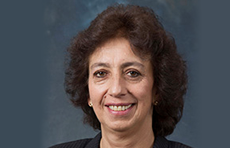
Accessibility in Online Courses
Presented by Beatriz Potter
Accessibility design principles, the law, and fundamental guidelines to be compliant and successful.

